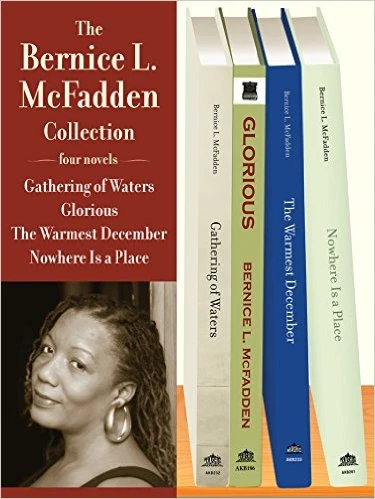PRAISE SONG FOR THE BUTTERFLIES: A New Take on Slavery
08/24/2015
Bernice McFadden is one of my favorite authors. She brings something lyrical and special to the canon of literature by and about Black women. Praise Song for the Butterflies, published in 2018, is one of many books by Bernice McFadden that leaves you tearful, then joyful, then inspired. She makes us want to read more, love more, then read some more.
The novel begins and ends in Harlem, but most of the book is set in Ukemby, a small fictional African country set between Ghana and Togo. It is about a middle-class family that is adversely affected by a government scandal, and the father seeks a “traditional” solution to their problems. We learn the tragic story of Abeo, whose father, encouraged by his mother, sacrifices their adopted child to become a slave, sexual and otherwise. Unknown to her mother, she is taken to a hidden shrine of an old tribal ”priest”, surrounded by younger, willing assistants, who accept virgins as young as age five to work with little food and to become sex objects when they reach puberty. Many of these children have babies of their own by the so-called priests, and then care for them as they work and supervise the younger girls. Any loyalty or protection goes punished severely, so they are leery of protecting each other. The act of rape, they are told, is being "touched by the gods," and they learn to accept it willingly. The sacrifice of young girls is supposed to bring good luck to the family, and if the girls escape and return, they are shunned by the parents who abandoned them.
Trokosi as defined by the author, “comes from the Ewe words 'tro', meaning deity or fetish, and 'kosi', meaning female slave.” According to author and professor Tina McElroy-Ansa, “It is this horrific practice that McFadden’s work illuminates. It is the belief in and practice of abandoning girls to serve life sentences as slaves to temple priests in order to protect their families from the gods’ anger — the sacrifice of an innocent for the sake of family honor, as punishment, and all beliefs that aim to make slavery palpable. In McFadden’s capable hands, these reasons ring as hollow as they are.”
While the story itself is fiction, set between 1978 and 2009, it recalls a number of real life cases of modern-day slavery. Trokosi is a real practice in many parts of Africa, and while it is outlawed by the government, it still exists under the secrecy and protection of those defending tradition. During the AIDS epidemic of the eighties, rumors floated around the continent that a man could be cured if he had sex with a virgin. Hundreds of young girls were raped in order to “cure” a more valuable man; the younger they were the more likely they would be virgins. And let us not forget the still-ongoing fight against the tradition of female circumcision, where young girls’ clitorises are roughly removed in initiation rites in order to deny her pleasure that might lead her to cheat on her husband, and so that she, when healed and broken again by her husband, would be a perfect fit just for him. Alice Walker explored this issue in Temple of My Familiar, the story of Celie’s daughter-in-law from The Color Purple. The results of this widespread tradition include infection, fistula, insanity, even death.
In more recent times, we have the case of 276 girls kidnapped at school by Nigeria’s militant Boko Harem, the most violent protest of educating women. They were raped, impregnated, sold, married off, and many have since died. We are still asking “Where are our girls?” The 2018 Global Slavery Index estimated 9.2 million Africans who are currently living in slavery as a result of armed conflict, forced labor and forced marriage. While Mauritania is the world’s last country to abolish slavery, it is at the top of the list of African countries that disavow slavery but in fact allow it to go on. As recently as last year, we were reading about slavery in Libya, Somalia and Eritrea. And if we include the worldwide spread of sex-trafficking, slavery is more prominent than ever. The list goes on and on. Notice that less than half these countries are in Africa.

McFadden brings all these issues to light in Praise Song for the Butterflies. It’s hard to imagine that life could be so harsh in 2018, but it is to many, especially young girls who are not valued or protected in their homes or in their native countries. So while the story itself is fiction, it teaches us the true meaning of abuse, pain, and redemption. I am a true fan of historical fiction. No history book could teach us more about the horrors of slavery than Toni Morrison’s Beloved. Praise Song for the Butterflies does the same thing for slavery in the 21st century
There is more to be learned about life in Black America from McFadden’s other books. They all feature heartbreaking stories of women who face overwhelming odds. Check them out. You'll be glad you did.
The Book of Harlan; Nowhere Is a Place; This Bitter Earth;
Gathering of Waters; Camilla’s Roses; The Warmest December;
Glorious; Loving Donovan; Sugar.

BERNICE L. McFADDEN is the author of The Book of Harlan (winner of the 2017 American Book Award and the 2017 NAACP Image Award for Outstanding Literary Work.) In addition to eight other critically acclaimed novels including Sugar, Loving Donovan, Gathering of Waters (a New York Times Editors’ Choice and one of the 100 Notable Books of 2012), Glorious, which was featured in O, The Oprah Magazine, she was a finalist for the NAACP Image Award. She is a four-time Hurston/Wright Legacy Award finalist, as well as the recipient of three awards from the BCALA. Praise Song for the Butterflies is her latest novel.